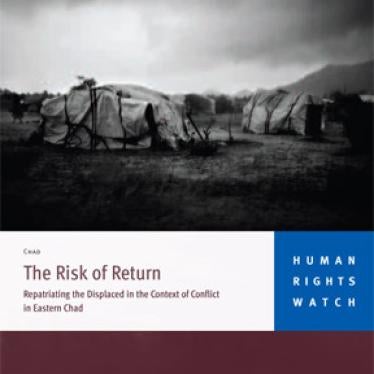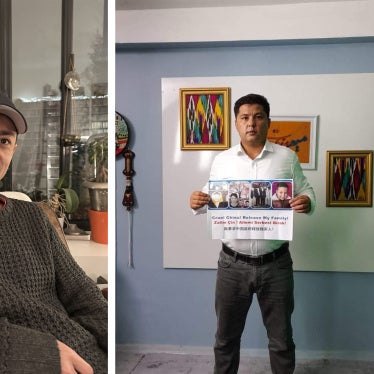To: Ambassadors of the Member States of the United Nations Security Council
Your Excellency,
Based on nearly a decade of reporting on the human rights situation in Chad, Human Rights Watch is gravely concerned about the consequences that any withdrawal of the peacekeeping force MINURCAT, as requested by the Government of Chad, could have on the protection and security of civilians, safeguards against human rights abuses, access to humanitarian assistance for refugees and displaced populations in eastern Chad, and security sector reform efforts.
The mission, despite many challenges, is improving protection and security for civilians, and should remain in place until clear progress is made in line with the benchmarks for the mission's withdrawal outlined by the Secretary-General in his December 2008 report to the Security Council.
Insecurity and Human Rights Abuses
Human Rights Watch has found that although widespread attacks on civilians have subsided since 2005-2007, civilians in eastern Chad remain vulnerable to persistent insecurity from a variety of armed groups including the Chadian army and Chadian and Sudanese rebel groups, and loosely organized criminal gangs. In the most severe battle between government and rebel forces in recent months, Chadian soldiers used indiscriminate force in and around Am Dam in May 2009, killing at least 15 civilians, raping women and girls, and looting civilian property including medical supplies.
Attacks by armed bandits on civilians represent another continuing threat. In many cases, bandits have targeted humanitarian aid operations. The UN has reported dozens of attacks each month on humanitarian operations, and reported more than 200 in 2009. These attacks include banditry, car-jackings, burglaries, abductions, and other assaults on UN and humanitarian staff that have led to fatalities in some cases and a reduction of assistance in some areas. Inter-communal conflict, fuelled by competition over resources, has also persisted.
To date, the vast majority of eastern Chad's 160,000 internally displaced and 220,000 Sudanese refugees have not returned home because of insecurity, human rights abuses, threats and attacks against returnees, lack of information about areas of origin, and lack of access to humanitarian assistance and basic services. These populations will likely remain in Chad until the security and human rights situation drastically improves. (Please see Human Rights Watch, "The Risk of Return: Repatriating the Displaced in the Context of Conflict in Eastern Chad," June 2009.)
The lack of effective law and order institutions in Chad, and especially in eastern Chad, has fostered impunity for violent crime, banditry, and human rights abuses against civilians including Chadian displaced populations and Sudanese refugees. Among the human rights abuses documented in eastern Chad are arbitrary arrests and detentions, sexual violence against women and girls, and forced recruitment of child soldiers by rebel groups and government forces. (Please see Human Rights Watch, "Early to War: Child Soldiers in the Chad Conflict," July 2007.) MINURCAT human rights monitors have observed these patterns in late 2009, as documented in the Secretary-General's October 2009 report, and into 2010.
Continuing Need for MINURCAT
In January 2009, the Security Council in Resolution 1861, authorized UN troops to replace the European Union bridging force (EUFOR) and extended the mandate of MINURCAT to March 15, 2010, citing insecurity in eastern Chad and northeastern Central African Republic, and the need to improve human rights and rule of law in eastern Chad. Just one month earlier in December 2008, the Secretary-General had set forth benchmarks for drawing down the mission, which include voluntary return and resettlement in secure conditions of a critical mass of internally displaced persons, and capacity of local authorities to provide the necessary security for refugees, internally displaced persons, civilians and humanitarian workers, and other benchmarks related to establishing rule of law in eastern Chad.
Despite delays deploying a UN military component to replace EUFOR and their inability to reach many volatile areas, the peacekeepers appear to have prevented a resumption of large-scale violence and mass killings. Local authorities and displaced communities have reported to humanitarian organizations that the UN forces have improved the security situation in recent months, and many are concerned that without the peacekeepers, insecurity will increase again.
In addition to existing security threats, the continued presence of an international peacekeeping force is necessary to anticipate a likely potential threat to civilians stemming from Chad-Sudanese relations. Notwithstanding the recent rapprochement between the governments of Sudan and Chad, the longstanding and deep-rooted tensions between these two governments and their support to each others' rebel movements could fuel more violence, as occurred following the signing of previous peace agreements between the two countries. Sudan's April elections in Darfur, where vast numbers of displaced people have boycotted the vote, could also fuel violence in Darfur and result in violence and further displacement to eastern Chad. Legislative elections in Chad in November 2010 could likewise have a destabilizing effect.
Human Rights Watch is concerned that an early drawdown will have serious negative consequences for the delivery of humanitarian aid in eastern Chad. MINURCAT civilian staff, UN agencies, and other humanitarian agencies rely on MINURCAT forces for escorts and to maintain security. Agencies on the ground have reported to Human Rights Watch that without the UN presence they would be required to limit their operations.
We are also deeply concerned about the negative impact of an early drawdown on the nascent rule of law work in eastern Chad. MINURCAT's mandate includes strong rule of law components, primarily focused on support to a Chadian police force, the Détachement Intégré de Sécurité (DIS), to provide security in and around displaced persons and refugee camps. The mission also provides key support to justice sector personnel, mobile courts, and correctional facilities in eastern Chad. These programs show initial signs of progress but require more support. The DIS is far from sustainable and still requires significant training, support, and oversight; an early withdrawal would bring this to a halt as well as other support to the justice sector.
Finally, an early withdrawal would seriously undermine MINURCAT's human rights efforts. MINURCAT human rights personnel are monitoring violations and working with the justice sector to advocate on behalf of victims of abuse. Without this monitoring function, the high levels of impunity enjoyed by Chadian security forces will go unchecked. Human Rights Watch is particularly concerned about reports of ongoing recruitment of child soldiers by the Sudanese Justice and Equality Movement (JEM) rebel group in northeastern Chad and by Chadian security forces. Chadian security sector reform efforts have made little progress addressing these violations.
To ensure that civilians in eastern Chad receive urgently needed protection and assistance, Human Rights Watch recommends council members take the following measures:
- Renew MINURCAT's mandate and authorize its continued deployment according to the council's original plan in Resolution 1861;
- Ensure the phasing out of the mission is based on meeting the benchmarks the Secretary-General outlined in his December 2008 report to the council. In this regard, it should require MINURCAT to work with the Chadian government to set out a plan for meeting key benchmarks and phasing down its operations.
Respectfully yours,
Georgette Gagnon
Executive Director, Africa Division







